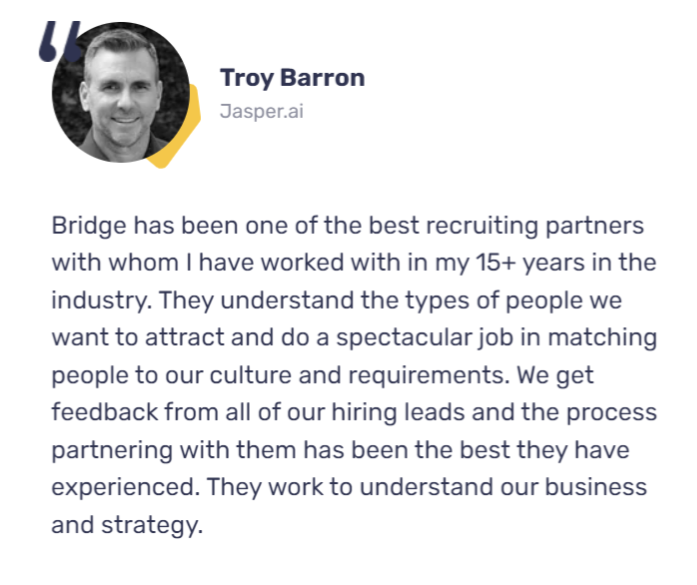Despite the mass tech layoffs, the demand for top-notch talent is all-time high, according to Robert Half Technology’s 2023 IT salary report. As the report states, companies are on the lookout for skilled professionals. For instance, 56% of surveyed businesses are about to hire for new roles. Likewise, 39% are actively seeking replacements for vacated positions.
As a talent sourcing agency, we at Bridge can also agree that despite the recession and a series of layoffs happening in big companies like Meta and Microsoft, many startups and mid-sized businesses are, on the contrary, willing to welcome new team members on board. Based on our expertise and our client cases, in this article, we want to tell you about the most in-demand tech jobs for 2023. As well, we are going to share some winning strategies on how you can hire new talent in the most optimal way, so keep reading to learn more!
What are the most in-demand tech jobs for 2023?
The tech jobs below have caught our attention because of their particularly growing demand. By hiring these professionals in 2023, businesses can unlock new possibilities, fueling the creation of innovative digital products and services. So, let’s dive in!
Data scientists
Many businesses, from small to large, rely on data to improve their business operations and gain actionable insights. At the same time, the cost of bad data can be devastating for your enterprise. As stated by the recent research, around 20% of companies claimed to lose their clients due to poor or inconsistent data. That’s why, hiring skilled data scientists is a number one priority for many businesses today.
For example, we have recently collaborated with Obvious.ly, an influencer marketing agency. The company wanted to hire data scientists with a specific skill set in a short time span, and reached out to us for help. Using our proprietary sourcing engine, we managed to provide up to 10 qualified candidates for an interview per week, enabling our client to save time and allocate resources to other critical tasks.
Responsibilities of data scientists
- Uncover patterns and trends in data.
- Predict future outcomes using statistical analysis and machine learning techniques.
- Provide valuable insights for strategic decision-making.
- Develop and implement predictive models.
- Collaborate with stakeholders to understand business objectives and formulate data-driven solutions.
- Communicate findings effectively through data visualization.
Skills of data scientists
- Statistics, calculus, and linear algebra expertise.
- Knowledge of programming languages, like Python, R, SQL, Java, Scala, and more.
- Data visualization skills.
- Knowledge of predictive modeling and machine learning.
- Understanding of model deployment and production.
- Business and technology acumen.
Cloud engineers
Talking about high-demand tech jobs we can’t but mention cloud engineers. According to McKinsey, 95% of businesses struggle to capture cloud perks because of talent shortages. Apart from that, cloud computing remains one of the most sought-after skills, according to Deloitte, which is why these specialists are always in high demand, but in short supply. If you’re curious to learn more about ways to hire cloud engineers, feel free to read our dedicated article.
Responsibilities of cloud engineers
- Manage and maintain the organization’s cloud systems.
- Develop and deploy cloud-based applications.
- Facilitate the smooth migration of existing applications to the cloud.
Skills of cloud engineers
- Proficiency in identifying and implementing optimal cloud solutions.
- Knowledge of cloud platforms such as AWS, Azure, and GCP.
- Programming skills in languages like Python, Java, and R.
- Understanding of DevOps principles, APIs, and web services.
DevOps engineers
The DevOps market was valued at $8.7 billion in 2022 and is projected to reach $32.7 billion by 2028. Such factors as the adoption of hybrid systems, automation of business processes, and the surge in serverless computing are driving the market’s growth, increasing the demand for skilled DevOps specialists.
Responsibilities of DevOps engineers
- Deploy and manage automated applications.
- Maintain and monitor software systems.
- Assess the risks and benefits of implementing new systems.
- Facilitate collaboration between development and operations teams.
- Streamline processes to improve efficiency and productivity.
Skills of DevOps engineers
- Proficiency in coding languages such as C++, Java, Perl, Python, and Ruby.
- Familiarity with agile software development methodologies to promote iterative and collaborative development.
- Ability to utilize IT automation tools like Ansible, Chef, Puppet, and SaltStack for efficient deployment and configuration management.
- Strong analytical skills to identify and resolve issues in complex systems.
AI/ML developers
AI can be easily called the word of the year 2023, as it’s literally everywhere. From ChatGPT being claimed to replace recruiters to companies like Notion and Google joining the AI race, the world seems to go crazy about AI/ML solutions, which results in huge investments and a fierce competition for skilled engineers.
As stated in a recent study conducted by McKinsey, the integration of AI into various sectors is projected to contribute a staggering $13 trillion to the global economy by the year 2030. If you are about to hire AI/ML developers or machine learning engineers, pay attention to the responsibilities and skills described below.
Responsibilities of AI/ML developers
- Develop and implement machine learning models and algorithms.
- Analyze and preprocess data for effective model training.
- Collaborate with domain experts to understand and address business challenges.
- Deploy and integrate AI/ML solutions into production environments.
Skills of AI/ML developers
- Knowledge of programming languages, like Python, C++, JavaScript, Java, and more.
- Understanding of exploratory data analysis (summary stats, visualizations, data cleaning, and feature engineering).
- Expertise in machine learning algorithms.
- Knowledge of frameworks, like Apache Spark, Flask, .NET, AWS EMR, Hadoop, and YARN.
- Ability to protect ML solutions with AWS IAM.
Full-stack developers
Of course, among the top IT jobs in demand 2023, there are also full-stack developers. Tech companies value their all-in-one skill sets and the ability to handle front-end and back-end tasks. It allows employers to save costs on hiring several extra specialists.
Responsibilities of full-stack developers
- Develop and implement both front-end and back-end components of web applications.
- Construct and create user-friendly interfaces and responsive web designs.
- Write clean, efficient, and maintainable code.
- Collaborate with cross-functional teams to gather requirements and deliver effective solutions.
- Perform testing and debugging to ensure functionality and performance.
- Keep up with industry trends and new technologies to continuously enhance skills and knowledge.
Skills of full-stack developers
- Proficiency in programming languages like HTML, CSS, JavaScript, PHP, Python, Ruby, or Java.
- Experience with popular web development frameworks and libraries such as React, Angular, or Vue.js.
- Knowledge of database systems and familiarity with both SQL and NoSQL databases.
- Understanding of software development principles, including version control (e.g., Git), agile methodology, and software testing.
- Ability to work with APIs and integrate external services into web applications.
By considering these responsibilities and skills, you can hire full-stack programmers and ensure efficient software development.
Web3 developers
Over $23 billion was invested in Web3 projects in 2022. Yet, there is a shortage of these specialists, which hinders the growth of Web3 and increases competition for their skills. In our guide, we have discussed ways to attract Web3 developers despite the ongoing competition and high salary expectations, so feel free to check it out.
Responsibilities of Web3 developers
- Develop and deploy decentralized applications (DApps) using blockchain technologies.
- Carry out and program smart contracts to enable secure and transparent transactions.
- Ensure data privacy and integrity through the application of cryptography and security principles.
- Collaborate with stakeholders to define and understand the business requirements of Web3 applications.
- Stay updated on the latest advancements and trends in Web3 technologies.
Skills of Web3 developers
- Understanding the fundamental concepts of blockchain technology and its applications.
- Proficiency in blockchain programming languages such as C++, Java, JavaScript (JS), Python, and Golang.
- Deep comprehension of cryptography and security principles in the context of Web3.
- Knowledge of decentralized finance (DeFi) concepts and protocols.
- Familiarity with blockchain platforms and frameworks like Ethereum, Polkadot, or Solana.
Blockchain developers
The worldwide blockchain market is estimated to expand from $17.57 billion in 2023 to $469.49 billion by 2030. So it’s no wonder that blockchain developers are in high demand. Their role encompasses designing, building, testing, and managing blockchain networks, smart contracts, decentralized apps (DApps), and associated technologies.
Responsibilities of blockchain developers
- Design and develop secure and scalable blockchain networks.
- Create and implement smart contracts to automate processes and transactions.
- Build decentralized applications (DApps) using blockchain platforms.
- Ensure the integrity and security of blockchain systems through cryptography and hashing techniques.
- Collaborate with cross-functional teams to integrate blockchain solutions into existing systems.
Skills of blockchain developers
- Proficiency in constructing blockchain networks, including consensus mechanisms and network protocols.
- Understanding of digital signatures, public-key cryptography, and cryptographic hashing algorithms.
- Competence in programming languages specific to blockchain development, such as Solidity, JavaScript, Go, or Python.
- Familiarity with blockchain platforms like Ethereum, Hyperledger Fabric, or Corda.
- Knowledge of smart contract development and deployment using frameworks like Truffle or Remix.
- Experience with blockchain development tools, such as Ganache, Web3.js, or Infura.
- Understanding of token standards like ERC-20 or ERC-721.
.NET developers
According to Statista, the .NET framework was used by 34.55% of respondents in 2022. That’s why the best tech jobs for the future are hard to imagine without .NET developers. Thanks to the framework’s cross-platform compatibility and rich ecosystem, the demand for .NET professionals remains high and companies are willing to pay a good sum for vetted .NET experts.
To hire .NET developers, consider the responsibilities and skills described below.
Responsibilities of .NET developers
- Write clean, scalable code using .NET programming languages.
- Create technical interfaces and specifications.
- Develop and test software prototypes.
- Design client-side displays and user interfaces.
- Support software personnel in project-related activities and additional duties.
- Collaborate with other software professionals and developers to coordinate efforts.
Skills of .NET developers
- Knowledge of .NET languages such as C# and VB.NET.
- Strong understanding of digital signatures, public-key cryptography, and hashing algorithms.
- Understanding of ASP.NET, .NET web forms, Ajax, and IIS runtime parameter optimizations.
- Experience with the .NET framework, including the Common Language Runtime (CLR), Framework Class Library (FCL), and ASP.NET.
- Competence in data access and reporting using SQL Server.
Unity developers
Unity powers more than 50% of mobile games and is widely used for creating mobile, VR, AR, and PC/console games. Many popular titles, such as Cuphead, Hearthstone, Among Us, and so on were developed with Unity, which is why many game development companies are actively recruiting Unity developers for their projects.
Responsibilities of Unity developers
- Implement game functionality based on design specifications.
- Translate design concepts into functional games or interactive applications.
- Work in a fast-paced and agile environment to develop and add new features.
- Collaborate with team members to establish an efficient pipeline and integrate media assets.
- Design, build, and maintain clean, reusable, and reliable code.
- Identify and address bottlenecks and bugs, providing effective solutions.
- Incorporate player feedback to optimize game elements.
Skills of Unity developers
- Proficiency in Unity, including scripting, animation, and GUI.
- Strong C# programming skills for Unity scripting.
- Knowledge of level design, game physics, and particle systems.
- Experience in mobile and console game development.
- Expertise in 3D/2D development and VR/AR.
- Understanding of OOP and Data-Oriented Programming.
Cybersecurity specialists
Cybercrime is rising rapidly, projected to reach $10.5 trillion by 2025. Therefore, experienced cybersecurity specialists are among the most in-demand tech jobs today. Their roles vary based on specific needs and responsibilities, but here’s what these specialists can help you with in general.
Responsibilities of cybersecurity specialists
- Implementing security measures for software systems, networks, and data centers.
- Identifying vulnerabilities and assessing risks in hardware and software.
- Testing and monitoring security defenses.
- Building firewalls and detecting intrusions.
- Reporting security activities to stakeholders.
Skills of cybersecurity specialists
- Proficiency in programming languages such as C, C++, C#, PHP, Perl, Java, Shell, and so forth.
- Knowledge of penetration testing and IoT security.
- Malware analysis and mitigation proficiency.
- Risk analysis and cloud security knowledge.
If you want to learn more about cybersecurity experts, consider reading our dedicated article.
Strategies to hire the most in-demand tech talent
Now that we discussed the most trending professions in the ICT sector, let’s talk about some strategies on how you can attract these rare gems before your competitors do.
Collaborating with freelancers
In the United States, there are over 56.7 million freelance workers, comprising approximately 40% of the American workforce. So, is collaborating with freelancers worth it? Let’s look at some pros and cons.
Pros of hiring freelancers
- Cost-effectiveness. Freelancers offer lower rates compared to full-time employees and they are normally working on a per-project basis. Also, as freelancers are self-employed, you don’t have to pay for insurance, taxes or handle payroll.
- Access to a large talent pool. As mentioned, there are around 57 million freelancers in the US only, but you can hire freelance talent from anywhere around the globe, enabling you to find the right talent much more easily.
- More advanced expertise. As freelancers work on different projects, they can have better experience in various domains, which is not quite common for in-house talent.
Cons of hiring freelancers
- No long-term commitment. Working on a project basis, freelancers usually switch employers after their work is done. So when you are looking for a long-term commitment, collaborating with freelancers might not be the best choice.
- Limited control. When you’re planning to hire freelancers from abroad, you have to make sure you have the right set of tools for managing remote employees, since otherwise, it can become challenging to ensure your freelancers are performing well.
- Integration challenges. To make sure your freelance employees are working just like your in-house employees, you will have to care about the thorough onboarding process.
- Loyalty issues. Freelancers can work on multiple projects simultaneously, so if you’re looking for dedicated employees, collaborating with freelancers might not be your go-to.
Who it best works for
You can opt for collaborating with freelance tech professionals when:
- Your project is short-term.
- You don’t want to spend a lot of money on a hiring campaign.
- You have previous experience of working with freelancers.
- You’re looking for professionals to deal with small tasks and free up your in-house staff.
Hiring in-house developers
While freelancers do have their merits, nothing can replace dedicated full-time developers still. That’s why big tech companies focus on creating high-performance teams that believe in their goals and values. Here are some pros and cons of opting for this approach.
Pros of in-house developers
- Full commitment. In-house developers are dedicated solely to your project and have a great interest in the success of your business.
- Better communication and more control. As your employees work in the same office, you won’t have to deal with communication tools, manage different time zones, or spend additional time managing your remote employees overall.
- Reduced confidentiality risk. In-house teams minimize the risk of confidential information breaches by keeping sensitive data within the organization.
Cons of in-house developers
- High costs. In-house development requires significant financial investment for equipment, training, and employee maintenance.
- Time-consuming. The recruitment process and onboarding of new employees can take a lot of time.
- Limited talent pool. When you’re planning to hire talent in your local area, your talent pool becomes much more limited and there are no guarantees you will find the fitting candidate effortlessly.
Who it best works for
Consider hiring in-house developers if:
- You have a long-term project.
- Strong team collaboration is your priority.
- You have enough time and budget for setting up a hiring campaign.
IT staffing
With IT staffing, you can extend your in-house team with the right specialists without the need for starting a full-scale hiring campaign. What’s more, when partnering with an agency, you won’t have to deal with team setup, payroll, and operations, since your partner will take care of all this stuff.
Let’s look at the pros and cons to get a better picture.
Pros of IT staffing
- Cost-effectiveness. Hiring tech specialists on a temporary or contract basis can be more cost-effective compared to hiring full-time employees. For example, at Bridge, we offer Senior software engineers starting at $220/day.
- Hiring time. IT staffing saves time and effort, since your partnering agency is responsible for screening and shortlisting qualified candidates, eliminating the need for you to sift through numerous applicants.
- Access to a wide talent pool. Experienced IT staffing agencies have an extensive database of potential candidates. For example, at Bridge, we have access to more than 900K developers across the world.
- Full flexibility. IT staffing offers flexibility by providing skilled contractors for short-term projects. This allows employers to adjust their workforce as needed.
Cons of IT staffing
- Lack of control. Choosing IT staffing, companies have less control over the search of candidates. That’s why it’s better to partner with reputable agencies with years of experience and high client loyalty.
- Integration challenges. New team members may require time to adjust and integrate into the company’s culture, processes, and workflows.
- Limited long-term commitment. IT staffing generally involves short-term or project-based engagements.
Who it best works for
IT staffing is a viable option to consider in the following situations:
- When you have a specific project with a defined timeline that doesn’t require the long-term commitment of hiring full-time employees.
- When your business experiences fluctuating workloads or seasonal demands.
- When your in-house team lacks certain specialized skills or expertise required for a project.
Sourcing-as-a-service
Instead of starting a hiring campaign that involves numerous stages, consider sourcing-as-a-service. Here’s how it works if you partner with Bridge. Based on your requirements, we will provide you with a list of candidates that match your position, who were pre-vetted by our specialists. Our sourcing process is 80% automated, enabling us to find the right talent up to five times faster compared to manual search.
Pros of sourcing-as-a-service
- Cost savings. Unlike collaborating with a full-time hiring expert, with our sourcing-as-a-service you only pay a monthly fee, which is a fraction of the cost you would pay when hiring in-house employees.
- Faster hiring. With our sourcing engine built specifically for engineer recruitment, you can start getting the first candidates for an interview within 3 business days.
- Expertise and industry knowledge. Generally, sourcing-as-a-service providers specialize in talent acquisition and possess deep industry knowledge. For instance, in Bridge, our tech-savvy sourcers are responsible for vetting each applicant before recommending them for an interview
Cons of sourcing-as-a-service
- You will still have to interview candidates. Unlike other strategies, sourcing-as-a-service saves you time on candidate screening and vetting, but you will still have to interview your engineers-to-be.
- Security concerns. If you want to make sure no sensitive information is leaked, consider partnering with agencies like Bridge that are ready to sign NDA and other security-related contracts.
Who it best works for
Consider opting for sourcing-as-a-service in the following situations:
- When your organization lacks the resources or expertise to source tech talent effectively.
- When you need to hire talent fast.
- When you don’t want to spend a lot of resources on a hiring campaign.
- When you have specific hiring criteria.
As an example, our sourcing-as-a-service helped Jasper.ai, the leading AI content platform, get 20 qualified candidates in just one month. The company was looking to hire 10 new front-end and full-stack engineers with experience in specific JS technologies that live in the most popular engineering areas (Bay Area, Austin, Seattle, New York) in the shortest time possible. With our help, Jasper managed to attract the right talent, while achieving an average cost per hire of $1500.

Conclusion
The request for top-notch tech talent is high in 2023, with 79% of professionals landing new jobs within three months. In this article, we have highlighted the 10 most in-demand tech jobs and provided strategies for successfully hiring the best candidates. By understanding the pros and cons of each approach, you can now make a more informed decision on what approach to choose.
And when you need some help with talent acquisition, you can count on us. At Bridge, we specialize in connecting businesses with top tech talent. Our proprietary sourcing engine and expertise in the tech industry allow us to identify qualified candidates efficiently, saving time and resources for our customers.
Don’t miss the opportunity to power your team with bright tech minds – contact us today!



